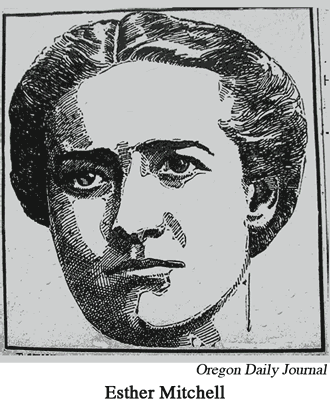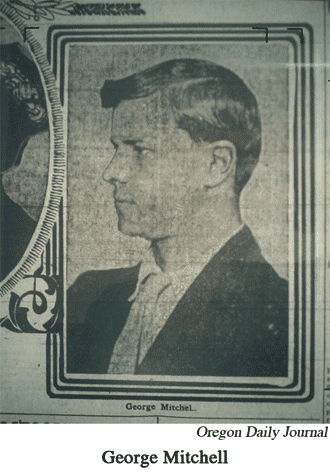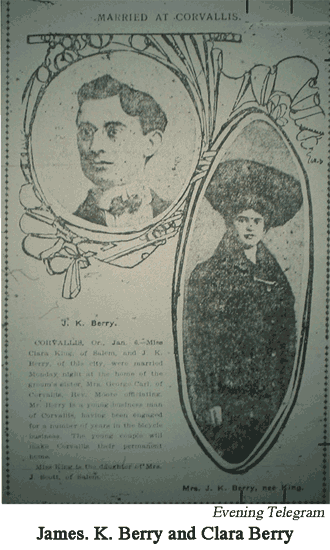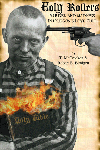Holy Rollers: Murder and Madness in Oregon's Love Cult
by T. McCracken and Robert B. Blodgett
CHAPTER SEVEN
Esther: The Chosen One
***
What can wash away my sin?
Nothing but the blood of Jesus.
What can make me whole again?
Nothing but the blood of Jesus.
Oh, precious is the flow
That makes me white as snow;
No other fount I know,
Nothing but the blood of Jesus.
From the Reverend Knapp’s Bible Songs of Salvation and Victory
***
 Brooks sought shelter in a house in Wren, a small village fifteen miles west of Corvallis. “The Lord sent me here,” Brooks said, startling a woman in her kitchen. Mud-splattered and rain-soaked, he threw himself onto the floor by the fire, and loudly thanked the Almighty that he had at last found a “friendly refuge.” He told the woman that he was “an apostle from God” and asked whether she would kindly cook him dinner.
Brooks sought shelter in a house in Wren, a small village fifteen miles west of Corvallis. “The Lord sent me here,” Brooks said, startling a woman in her kitchen. Mud-splattered and rain-soaked, he threw himself onto the floor by the fire, and loudly thanked the Almighty that he had at last found a “friendly refuge.” He told the woman that he was “an apostle from God” and asked whether she would kindly cook him dinner.
“All right,” she replied. “Just wait a few minutes.” She’d need to get some items at the village store--you can’t serve just any dish to an apostle from God, after all.
When she got to the store she told five “stalwart backwoodsmen” who were hanging about that she had one of the Holy Roller apostles at her house.
Would they mind getting rid of him for her?
With pleasure!
They went back to the woman’s house and pitched Brooks “into the rain and darkness, with an emphatic ‘git.’”
Within days, though, both he and Creffield were back at the Hurts’ home, brought there by Frank Hurt. To Frank and the rest of the flock Creffield was still God’s Elect, Joshua, the one who could communicate directly with God and tell them, the Holy Ones, what to do next. With the end of the world in immediate view, they needed him now more than ever. Who else could receive the necessary instructions telling them how to prepare for glory?
“The Hurt family had the sympathy of the community for being a prey to such fanaticism,” the Telegram said, “but now that they followed up Creffield when he took to flight, and brought him back and are now harboring him in their home, another chapter has been opened up in the scandal that has made Corvallis the subject of much ridicule.”
 “We do not care what the newspapers have to say,” Maud Hurt said. “In fact we expected them to misrepresent us. We have not taken the trouble to read their accounts of us and our sect.”
“We do not care what the newspapers have to say,” Maud Hurt said. “In fact we expected them to misrepresent us. We have not taken the trouble to read their accounts of us and our sect.”
When a reporter asked whether he could speak to her father, Maud said he was busy seeking God. “He has not as yet spoken to anyone of the world,” she said, “and I could not disturb him at present.”
When O. V. Hurt then did come to the door, Maud shooed him away, telling him she didn’t think it was necessary for him to answer any questions. “Judging from the humble way in which the man of the house obeyed this admonition,” the Telegram said, “he is under complete control of the fair members of the Rollers, who in turn seem to center their utmost faith on Creffield, the apostle.”
The Hurts’ phone was disconnected. Through Joshua, the Holy Ones had a direct line to God. What more did they need?
In mid-November the Holy Rollers began to enlarge the Hurts’ house, turn it into a fit tabernacle for Joshua. While the work was being done, the neighbors were given a respite from the Babel of weird sounds that had emanated from the house for months.
And O. V. Hurt was also given a respite. His head stopped spinning enough that when James Berry suggested they go to Portland he didn’t reject the proposal out of hand.
And in Portland O. V. had an epiphany.
“Removed from the influences that biased his better judgment here,” the Gazette reported, “and out of the reach of the emotional excesses that surrounded him in his home, Mr. Hurt’s mind returned to its normal condition.”
“I studied his [Creffield’s] proposition for an entire week,” O. V. said, “looking at it from every point of view, and then decided that I would have nothing to do with it as his religion was nothing more than hysterical sentiment.”
Hallelujah!
On his return from Portland, O. V. told Creffield he was no longer welcome in his home. “He took all his things and left,” a relieved O. V. said. “The same in regard to Brooks.”
Sam Starr, whose wife Hattie had been held under Creffield’s spell, declared that if he ever again saw Creffield, “the latter will do as much rolling and tumbling in five minutes as he has been doing all summer.”
O. V. Hurt may have rejected Joshua, but the rest of his family hadn’t. His son, Frank, took Creffield west in a one-horse buggy through the Alsea Valley. November wasn't the time of year to travel through the Coast Range--not that there really was a right time of year. The road--more of a trail, really, than a road--after one rain was a muddy trail, and after two rains was an almost impassable muddy trail with streams crossing it. A week before a trip smart travelers on it had made inquiries about the weather and road conditions, and brought with them a bedroll, plenty of food, shovels, saws, axes--and dynamite. Really smart travelers stayed home.
But Frank and Creffield weren’t just any travelers. Frank was one of the Holy Ones and Creffield was God’s Elect, Joshua, God’s Holy Prophet. So off they went, crossing into the valley via Preacher Creek Mountain.
Could they have found a more fittingly named route? Surely another sign that the Holy Ghost was looking out for them.
They headed down to Five Rivers, but when they tried to ford the swollen waters, their buggy overturned. Not only did the two men do more rolling and tumbling in five minutes than they had done all summer, they were baptized as they, along with their horse, were swept downstream about two hundred yards. Eventually all three managed to scramble safely ashore, but the buggy was destroyed.
Frank returned to Corvallis and he and his wife, Mollie, rented a house on the east bank of the Willamette River. Like O. V. Hurt’s house, it was just outside Corvallis’s city limits, thus outside of where Creffield had been legally barred from holding services. The house--with the barest of necessities--became Creffield’s new tabernacle as he and about a dozen other of the Holy Rollers moved into it.
Joshua told the group that God had again spoken to him, told him of some new teachings, new ways of cleansing themselves of sin, of attaining purity. Wesley Seeley contemplated what he was hearing, what it took, according to Joshua, to be purified. He knew he didn’t have it in him to perform the necessary rituals. He risked eternal damnation and having his name stricken from the Holy Roll in Heaven, and left Creffield’s church. Two of his sisters, Florence and Rose, however, stayed. Wesley, already having risked God’s wrath, didn’t tell anyone outside of the flock what his sisters and the others were about to do.
Joshua made another astonishing announcement that evening: he was going to marry Esther Mitchell, now sixteen.
Like Hell he was.
Before any such thing had a chance of happening, Esther’s older sister, Phoebe, committed her to the Boys’ and Girls’ Aid Society, an institution for homeless and abused children in Portland. She would have committed her to the state insane asylum, but Esther was too young to be sent there.
“Hallelujah! Glory to God!” Esther shouted over and over while being admitted. “Hallelujah! Glory to God! Hallelujah! Glory to God!”
Joshua was “God”--not just God’s Holy Prophet--she said, and that Joshua had command over her. She shouted and shouted until she fell in a faint.
“Bright, but deranged,” the physicians at the Aid Society wrote. “Mind almost unhinged by religious fanatics called the ‘Holy Rollers’ in Corvallis.”
When Perry and George Mitchell, Esther’s brothers, went to see her at the Aid Society she said she didn’t recognize them. George, eighteen, who had doted on Esther since their mother had died and their father had abandoned them, pleaded with her, telling her she had to recognize them, that he and Perry were her brothers.
If that was so, she said, they were her brothers “in name only.”
George was devastated.
“I had my own living to make,” he said, “and you can’t make enough in a lumber mill or a lath factory to give up all your time to such things”--such things as pleading with your bright but deranged sister.
George couldn’t eat or sleep. Perry, twenty, told him that if he didn’t quit worrying about Esther, he “would soon be as nutty as the Holy Rollers.”
In the Aid Society, Esther wouldn’t associate with the other girls. Almost around the clock, she rolled on the floor, her Bible clasped in her hands, while she shouted “Glory to God.” When forced to go to bed by Mary Graham, the matron, Esther would go, but at the first chance would get up and begin rolling again.
One night Esther told the matron that she had been receiving messages from God. After that, the matron said she was afraid to allow Esther to stay at the Aid Society lest she receive a message from God telling her to kill some of the other children there. What had Brooks and Creffield said at their sanity hearings when asked whether God was likely to command the killing of a human being? God had never commanded them to do anything of that kind . . . yet.
But what if God did make such a command?
Yes, they said, if the Lord bade it.
Would He now make such a command to the bright but deranged Esther?
Something had to be done about Creffield.
That was all that was discussed on Main Street Monday night, January 4, 1904. Well, that and James Berry’s wedding. James, having recovered from Maud’s rebuff, had earlier in the day married Clara King, of Salem. “Both are young people of high character and standing,” said the Times.
Of more immediate interest, though, to those gathering on the street were rumors that someone had reported seeing on Smith Island a naked Creffield surrounded by a bevy of women. Not only that, he--or was it a she? Exactly who the someone was, wasn't known. But it didn’t really matter. This someone, it was said, had not only seen a naked Creffield surrounded by a bevy of women, but had also taken a photo of this . . . this . . . outrage. “Adam and Eve were put into the world without clothing,” Creffield had said. “That is the way we should live.”
And what exactly was to be made of the story of that young woman “prominent in society circles,” the one who said she was “held prisoner” by Creffield in the old Capitol building while she was “in a trance”? She, whoever she was--did it really matter--refused to discuss what had gone on between her and Creffield while she was in this compromising situation.
Which is as it should be.
Young women of high character and standing do not discuss the more intimate details of their lives. But it was safe to assume something indecent had taken place.
The law be damned. Something had to be done about Creffield. These were their wives and their daughters being led astray under some hypnotic influence, women of high character and standing, God-fearing, decent women. Most important, these were their women.
By nine o’clock, a plan was settled upon. Twenty men calling themselves the “White Caps” boarded the ferry.
There was not a boy or hoodlum in the party [the Times said]. “In the main, they were persons who have felt the results of the strange spell that the apostles have seemed to exert on the members of families, often in a way to bring sorrow and trouble. It is believed that their purpose was not for motives of revenge, but an effort to get Brooks and Creffield out of the community, hoping thereby to secure a rest from the religious agitation which has dethroned the mind of one young woman [Esther Mitchell] of its reason, at least temporarily."
The ferryman let the White Caps off about two hundred yards from Frank Hurt’s house. The group quickly surrounded the perimeter, cutting off all avenues of escape, and broke down the door. In the house, Creffield and Brooks sat amid about a dozen barefoot followers. They looked as though they had been expecting something like this for some time.
“They killed Christ, killed the apostles and stoned the disciples to death, and we expect them to do anything with us,” one of the women cried. “It is either Heaven or Hell, and I am for Heaven.”
The male Holy Rollers who were in the room--Creffield, Brooks, Levins, and Campbell--were ordered to put on their shoes and hats. While the men complied, the women sang--all but one who stared intently at each intruder’s face.
The four men were bound with rope, ordered out the door, and were marched directly to the ferry. Once across the river in Corvallis, the White Caps didn't bother to take the back streets. They knew that no one--not even the sheriff and his damned adherence to the letter of the law--would interfere with their plan. The light of a winter moon shone clear and bright in the eastern sky, and the men passed directly under streetlights as they walked from the ferry to Main Street. From there they went to the first bridge past the sawmill and ordered Creffield and Brooks to take off their clothes.
“Let us pray,” Creffield said.
“We have heard too much of your prayers already,” a White Cap growled.
“Lord, forgive them for they know not what they do,” Creffield said.
***
Jesus, my Lord, to Thee I cry,
Unless Thou help me I must die;
Oh, bring Thy free salvation nigh,
And take me as I am!
From the Reverend Knapp’s Bible Songs of Salvation and Victory
***
Some of the newspaper articles that are sources for this chapter:
October to December 1903: Holy Rollers Burn Furniture & Pets
January to March, 1904: Holy Rollers Tarred and Feathered
***
Chapters from
Holy Rollers: Murder & Madness in Oregon's Love Cult
Part 1: The Seduction
Chapter 1: Trust Me, Brothers And Sisters
(Life Before Creffield [B.C.])
Chapter 2: God, Save Us From Compromising Preachers
(Creffield's Preachings)
Chapter 3: The Flock
(Profiles of the Holy Rollers Were)
Chapter 4: The Holy Rollers
(Things Start to Get Wild on on Kiger Island)
Chapter 5: Housecleaning
(There's a Sacrificial Bonfire)
Chapter 6: Community Concerns
(Officers Visit)
Chapter 7: Esther, The Chosen One
(Creffield Plans to Marry 16-Year- Old)
Chapter 8: Tar and Feathers
(The Men of Corvallis Act)
Chapter 9: Sane People Don’t Go Bareheaded
(Holy Rollers are Committed to the Asylum)
Chapter 10: More Beast Than Man
( Creffield is Arrested)
Chapter 11: God Will Plead Creffield's Case
(Creffield in Court)
Chapter 12: Scandal
(Shocking Testimony at the Trial)
Chapter 13: Calm Before the Storm
(The Holy Rollers Resume their Lives)
Chapter 14: Giving Up The Ghost
(Men are Gunning for Creffield)
Part Two: The People V. Creffield
Chapter 16: The Widow Creffield
Chapter 19: An Inherited Streak of Insanity
Part Three: The Madness
Chapter 23: Seeking Reconciliation
Chapter 24: Another Holy Roller Page One Murder
Chapter 25: What Can Papa Do For You?
Chapter 26: Human Life is Too Cheap In This Community
Chapter 30: The Final Chapter
(What Happened to Everyone Afterwards)
The Epilogue
(Heaven's Gate)
Newspaper Articles about Creffield & the Holy Rollers
1897-1903: B.C. (Before Creffield)
October to December 1903:Holy Rollers Burn Furniture & Pets
January to March, 1904: Holy Rollers Tarred and Feathered
April to June 1904: Holy Rollers are Committed to the Asylum
July 1904: Creffield is Found & Arrested
September 1904: Creffield's Trial
April 1906: Men are Gunning For Creffield
May 1906: Creffield is Murdered, Murderer is Considered a Hero
May 1906: Holy Rollers Found Starving Near Heceta Head
June 1906: George Mitchell's Trial Begins
July 1906: Hurt Testifies of Debauched Wife and Debased Sisters
July 1906: Esther Mitchell Kills Her Brother
August to October 1906: Seattle Prepares for another Big Trial
November 1906: Maud Hurt Creffield Commits Suicide
April 1909-August 1914: Esther Leaves the Asylum
1953 Stewart Holbrook's Murder Without Tears
1951Startling Detective Magazine, Nemesis of the Nudist High Priest
***
